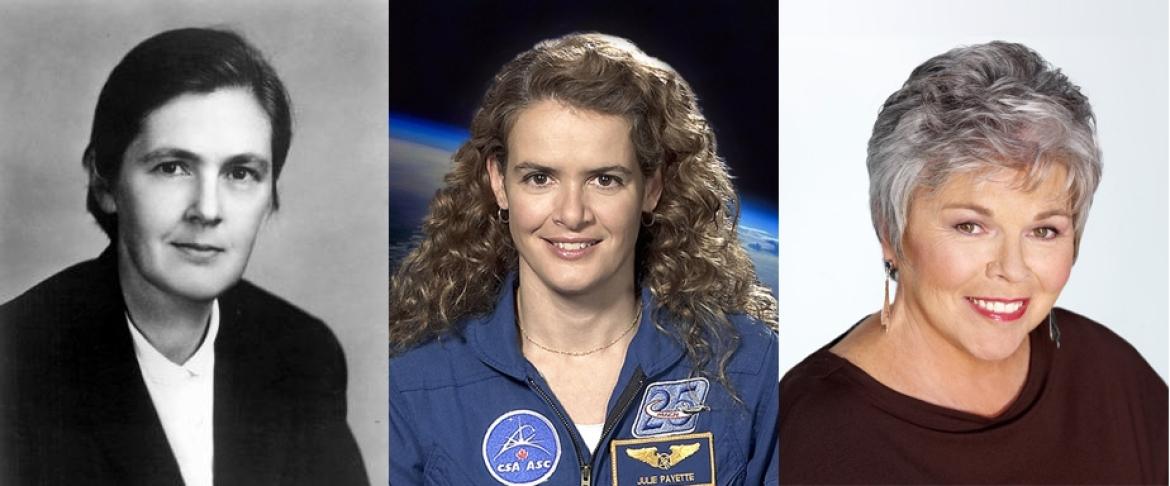
May 17, 2012 - 10:04am
Three women who have made remarkable contributions nationally, internationally and in space will receive honorary doctorates at Vancouver Island University’s spring convocation at the Port Theatre in Nanaimo June 4 and 5.
Julie Payette, of St. Hubert, Quebec, fulfilled her lifelong dream with two Space Shuttle missions in 1999 and 2009 and contributed to the Canadian Space Agency in a variety of other ways. She will receive an Honorary Doctor of Technology degree June 4.
On June 5, world-renowned pharmacologist Dr. Frances Oldham Kelsey will also receive an Honorary Doctor of Science degree. Dr. Kelsey, who was born in Cobble Hill on Vancouver Island and now lives in Chevy Chase, Maryland, took a historic stand at the U.S. Food and Drug Administration in 1960 when she refused to approve the release of the drug thalidomide in the United States.
The drug had been used as a sleeping pill and although it was considered safe for pregnant women to reduce nausea and vomiting it later proved to have caused thousands of severe birth deformities in Germany, Great Britain and Canada.
Also on June 5, Roberta Louise Jamieson, of Oshwekan, Ontario will receive an Honorary Doctor of Laws degree for her work promoting First Nations rights. Dr. Jamieson became the first Aboriginal woman to earn a law degree in Canada and has been a strong leader in First Nations affairs with extensive experience in conflict resolution.
“We are proud to recognize the achievements of these women who have demonstrated the profound impact that individuals can have to advance scientific knowledge, safeguard our health and promote the rights of individuals in our society,” said VIU President and Vice-Chancellor Dr. Ralph Nilson.
-30-
Backgrounder on VIU Honorary Doctorate Recipients
Julie Payette is the second Canadian woman to have flown in space. Not only is she an astronaut, Payette is an accomplished musician who has sung with internationally acclaimed choirs and orchestras. Born and raised in Montreal, Payette originally pursued a career as an electrical and computer engineer. She received an International Baccalaureate from United World College of the Atlantic in Wales in 1982 followed by Bachelor of Engineering from McGill University and Master of Applied Science-Computer Engineering from the University of Toronto.
In 1992, she was chosen by the Canadian Space Agency as one of four new astronauts from a selection of 5,330 candidates. She prepared for her first trip to space in 1999 by obtaining her commercial pilot’s license, studying Russian, working as a research operator on a reduced gravity aircraft, becoming a military pilot captain and obtaining a military instrument rating.
At the Canadian Space Agency, she has been a technical advisor for an advanced robotics system that Canada contributed to the International Space Station. On her 1999 mission aboard the Space Shuttle Discovery, her duties included supervising a space walk and operating the Canadarm. In 2009, Dr. Payette was flight engineer on board Space Shuttle Endeavour and operated three robotic arms as astronauts from five countries worked on the International Space Station. Her current position is CAPCOM (Spacecraft Communicator) for NASA’s Mission Control Centre.
“Her drive and commitment towards fulfilling her childhood dream to go into space is an incredible example of dedication,” said Dr. Greg Crawford, Dean of Science at VIU. “Her work in being an integral part of the Canada space program provides real-life inspiration for how science can be applied in amazing ways.”
Frances Oldham Kelsey graduated from McGill University with a BSc. and MSc., then attended the University of Chicago where she earned PhD and MD credentials. She taught at the University of Chicago and University of South Dakota before becoming a general practitioner in South Dakota.
Within the first month of joining the U.S. Food and Drug Administration in 1960, her first file was a request for approval of thalidomide for use in the United States. The drug was developed in the 1950s by a German pharmaceutical company and was widely used in Europe.
During the initial application process, the pharmaceutical company put strong pressure on the FDA to approve the use of thalidomide in the U.S. particularly since the leading opponent, Dr. Kelsey, was a junior researcher who was new to her position.
She stood firm in her opposition and helped avert further extension of the tragedy that afflicted thousands in other countries. The impact of her decision proved to have an even greater impact when publicity about the thalidomide case led to legislation in the U.S. that requires pharmaceutical companies demonstrate the effectiveness of new drugs, report adverse reactions to the FDA and ensure that patients in clinical studies give informed consent.
In 1962, President John F. Kennedy honoured Dr. Kelsey with the President’s Distinguished Federal Civilian Award, the highest civilian award in the U.S. When she retired at the age of 91, the FDA named one of its annual awards after her.
“Not only was Dr. Kelsey a new appointee at the FDA when she took her courageous stand against a powerful pharmaceutical organization, she was one of few women in such high positions in the medical field at this time,” said Cheryl Krasnick Warsh of VIU’s Department of History.
“By being a catalyst for the establishment of proper protocols for drug trials, she has saved countless thousands of lives and should be seen as an inspiring example of how one individual can effect change on an international scale.”
Roberta Louise Jamieson, a Mohawk from the Six Nations of the Grand River, is one of the most respected voices for Canada’s Aboriginal people. When she earned her law degree from the University of Western Ontario, she was the first Aboriginal woman in Canada to accomplish that feat.
Ms. Jamieson has been at the forefront in many fields. She is the first woman to hold the position of Chief of Six Nations and the first woman to be appointed Ombudsman of Ontario, a position she held for a decade. In 1982, she became the first non-Parliamentarian to be appointed an ex officio member of a House of Commons Committee, a task force on Aboriginal self-government. She was head of the Indian Commission of Ontario and has been a leader and skilled mediator with more than 25 years experience in conflict resolution, involving all levels of government.
She is a member of the Order of Canada, a recipient of the National Aboriginal Achievement Award and the Indigenous Peoples’ Council Award from the Indigenous Bar Association. She is currently President and CEO of Indspire.
“Ms. Jamieson represents what we, at Vancouver Island University, believe to be essential qualities in leadership, perseverance and commitment to the advancement of Aboriginal interests,” said Dr. David Witty, Vice-President Academic and Provost.
Tags: In the Community





